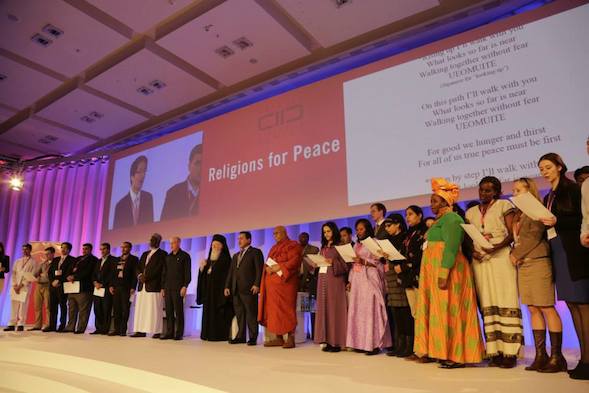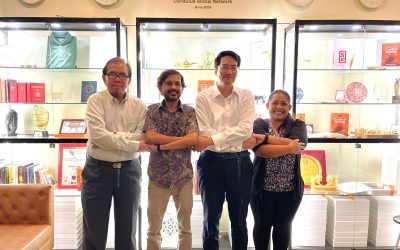Last week, the world’s largest network for interfaith dialogue, Religions for Peace, held its 9th General Assembly in Vienna, Austria. The event which was supported by KAICIID (King Abdullah Bin Abdulaziz International Centre for Interreligious and Intercultural Dialogue) saw the attendance of more than 600 religious and civil society leaders. But like so many interfaith events before, the role of companies have been left out of the equation. This was a missed opportunity for both the private sector and the interfaith movement as the issues of rising hostility to minorities; the need for inclusivity, discussed during the forum affects companies in a real way.
Earlier this year, misunderstanding and lack of education about the Halal label, resulted in protests in Colombo. This kind of misunderstanding is certainly not limited to Sri Lanka as many Asians openly practice their faith in business, thus misunderstandings though few, do arise from time to time. It is also normal to find that many companies in Asia, proclaim their religious identity openly by having altars or feature religious symbols in their work environments , this is very different from companies in the West where religious affiliation tend to be discreet. Therefore, particularly in Asia, inter-religious and intercultural issues affects the growth of enterprises in a real way.
How interreligious and intercultural knowledge can help companies
After eight years of involvement with the global interreligious movement, here are three aspects how companies can gain a competitive edge by having inter-religious and intercultural know-how:
1) Better integration of talent from different identities
Many Human Resource (HR) departments lack the capacity to appreciate the value of different identities and this can alienate talents who are keen to practice their faith. And as Asian companies expand regionally, it is important for HR to develop practices that welcome diversity and increase staff morale. Providing prayer rooms for Muslims; providing vegetarian dietary option for Buddhists, for example, are small gestures that can result in an increased sense of belonging. It is also a clear demonstration that you are ready to operate at a global level. But unfortunately, many companies dismiss such practices and do not demonstrate enough sensitivity, thus unknowingly undermine staff loyalty.
2) Better business strategies through understanding diversity
Increasingly, companies are operating in multi-identities environments. For example in Asia, the demand for halal food is rising, therefore there are real benefits in being able to market properly to this segment. Major fast-food brands like McDonald’s have adapted very well to this kind of environment and have a variety of menus catering to Hindus and Muslims in Asia. McDonald’s approach stems from a long history of appealing to a diverse customer base. Filet-O-Fish for example was created in 1962 in order to appeal to Catholics living in a neighbourhood in Ohio, USA. Therefore, being informed religiously and culturally can give you a competitive edge.
3) Better communication strategies by being inclusive
The other challenge that brands face is, how to communicate in a multi-identities environment. There has been mistakes in the past associated with insensitive advertisements that fail to respect religious and cultural identities. In 2011, DDB created an ad for a Chinese restaurant in Dubai which featured African and Indian customers with eyes that are of epicanthal fold or as some would refer to as ‘slanted eyes’. While the ad sought to be memorable, it failed to take into account cultural sensitivity. Beyond just being careful, marketers with a religious and cultural knowledge will benefit from the ability to create a more inclusive message.
Why the interfaith movement need to involve private enterprises as stakeholders
After the second world war, the global interfaith movement begun to take shape, led by religious leaders who believed that it is in their interests to ensure that such a terrible global event does not happen again. Much of the efforts have been focused on peace education and conflict transformation. Since the 1970s, religious leaders in the interfaith movement have been involved in conflict mediation efforts in Africa and till recently in Mindanao Philippines.5
Since 9/11 however, the interfaith movement took on a different emphasis, one that is more focused on interfaith, intercultural exchanges and understanding. The last decade or so has also seen the increase in the participation of youth in interfaith initiatives. The rise of large youth organisations such as the Interfaith Youth Core and Religions for Peace Youth Networks are signs of a generation that is pro-dialogue and engagement. But as the interfaith movement evolve, the role of business leaders have mostly been in the area of financial support and not as essential stakeholders in the process. This is a missed opportunity as private enterprises, like religious organizations are spread throughout the world and have as much to lose if their environments become intolerant of diversity. Here are three ways the interfaith movement can engage the business community:
1) Rethink the perception of business leaders
Many in the interfaith movement come from religious and educational backgrounds and are wary of engaging with business leaders who are perceived to be interested in solely commercial affairs. This is a pity because many faiths, especially those in Asia were spread by merchants in the past. Many educational institutions and hospitals continue to be supported by religiously-inspired business leaders.
2) Rethink the approach of engagement with companies
Many interfaith movements seek the support of companies in terms of sponsorship and long-term donations. It is time to take this further by asking companies to adopt inclusive policies in terms of hiring talents, developing products and services. Companies form a critical pillar of the world’s economy and have a direct impact on consumer choices. It is therefore far more effective to engage with companies than to engage with UN agencies who still need to ask companies to change their practices.
3) Create a common space for religiously-inspired business associations
In many countries, there are already religiously-inspired business associations such as the Muslim business chambers or Christian business networks. Interfaith movements can create a common space for these groups to come together and meet faith-inspired leaders to strengthen collaboration so as to shape a better world.
The private sector is probably the last major group of stakeholders left out of the global interfaith movement. It is not only necessary but important if the movement wants to increase effectiveness in terms of outreach. The theme of Religions for Peace General Assembly was “Welcoming the Other”. So perhaps it is timely to move out of the usual crowd in the movement and reach out those who do believe in the precepts and mission of the interfaith community but have often been regarded as the other.
This article is part of a weekly column called Shaping the World where Lawrence and Shiraz share insights and ideas about building innovative Asian Brands. It is published by one of the leading dailies in Sri Lanka, Ceylon Today.
Lawrence Chong is the CEO of Consulus, an innovation consultancy specializing in helping Asian companies transform their business models to rise up the value chain through business design, organisational development and designing new brand experiences. Consulus’ country representative in Sri Lanka is Shiraz Latiff who is also the CEO/Lead Consultant of Hummingbird International, a regional knowledge house specializing in coaching, consulting & outsourcing through global partnerships & collaborations.




